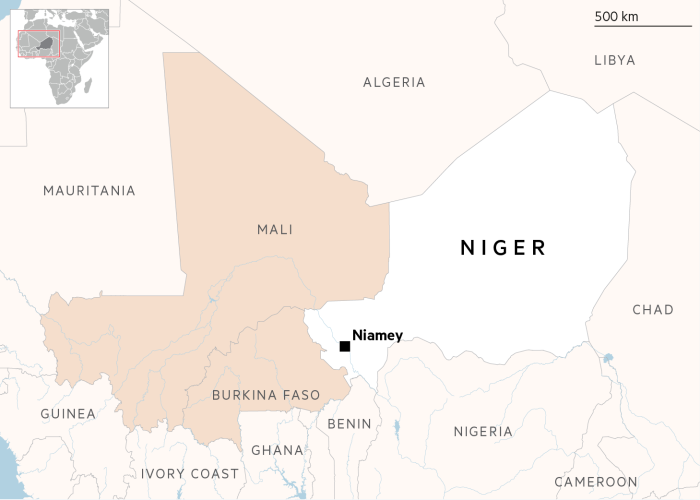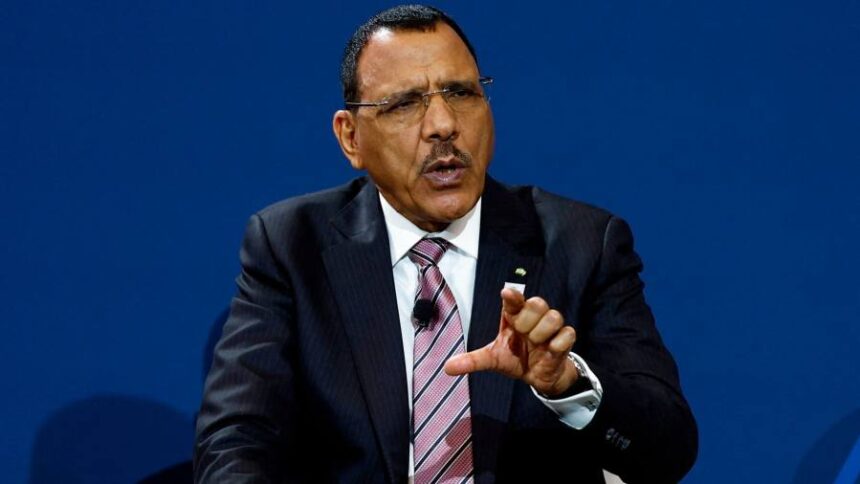Receive free Niger updates
We’ll send you a myFT Daily Digest email rounding up the latest Niger news every morning.
Niger’s presidential guards fired shots in the air on Wednesday night to disperse crowds who had rallied in support of President Mohamed Bazoum as an attempted coup against the pro-western leader continued without resolution.
On Wednesday morning members of the presidential guard had prevented Bazoum from leaving his residence, keeping him locked in all day. The armed forces, which remained loyal to Bazoum, said they would attack the presidential guard if negotiations to end the stand-off failed.
The army had secured “major strategic points” and was on the side of “legality”, according to a statement. The president was safe alongside his family, it said.
Reports indicated that General Omar Tchani, head of the presidential guard, had asked Bazoum to resign — a request the president had rejected.
“Those attempting this coup will maybe surrender or they’ll maybe have a battle on the grounds of the presidential palace,” said a Niamey-based political analyst who was following events. “The situation is very dangerous. Things can change from minute to minute ”
One senior military official close to Bazoum said “the jury was still out” on how the uprising would end.
The US, the UK and a number of other governments issued statements condemning the attempted coup. Nigeria’s president Bola Tinubu said his country would do everything in its power to protect Niger’s democracy. Benin’s President Patrice Talon said he was flying to Niger to mediate.
The EU issued a statement calling for Bazoum’s immediate release, adding: “Niger is a pole of stability in the region and it must remain so.”
An EU official said that President Charles Michel and Josep Borrell, the bloc’s high representative for foreign policy, had spoken twice to Bazoum on Wednesday. They also spoke to Mahamadou Issoufou, Bazoum’s predecessor, who was negotiating to end the crisis.
The move against Bazoum comes after a spate of military takeovers in the region, including in neighbouring Mali and Burkina Faso, which subsequently moved away from the west. The leaders of Mali’s 2021 coup expelled French troops and invited Russia’s Wagner Group to help fight an Islamist insurgency that has taken over swaths of the country.

Bazoum, who was elected in 2021, has by contrast welcomed French troops and courted both European and US help in combating jihadist attacks in Niger’s border regions. In an interview with the Financial Times in May, he defended France’s presence.
He has also paraded his pro-democracy credentials and progressive attitudes on women’s rights and education to court western support. Bazoum was one of several African leaders who decided not to attend Vladimir Putin’s Russia-Africa summit in St Petersburg this week.
The Economic Community of West African States denounced an “attempted coup d’état”, saying it condemned “in the strongest terms the attempt to seize power by force and calls on the coup plotters to free the democratically elected president”.
A close associate of Bazoum who was in contact with him on Wednesday said the president had woken and had his breakfast as normal but was then prevented by the presidential guard from leaving his home. His own bodyguards were locked outside, he said.
Since his election, Bazoum, who comes from a minority Arab clan, has been slowly consolidating a fragile power base by making his own appointments to important positions in the security apparatus.
Several people appointed by Issoufou, Bazoum’s predecessor, had been quietly retired. A move to retire head of the presidential guard Tchani, which was to have been announced on Wednesday, may have triggered the rebellion, observers said.
“Bazoum has been navigating a delicate political path,” said Paul Melly, a specialist oh the Sahel region at Chatham House think-tank. “It was going to be a gentle process of gradually establishing himself as his own man.”
Under Bazoum, Melly said, the army had received money, equipment and training from Europe and the US, securing greater loyalty to the president. Niger’s army had held jihadis at bay far more effectively than counterparts in Mali or Burkina Faso, he added.
A political analyst in Niamey said that, while much was at stake, a coup could still be averted. “If a coup goes through, that would change the dynamic. He’s almost the only western ally in the region still standing.”
Additional reporting by Henry Foy from Brussels








